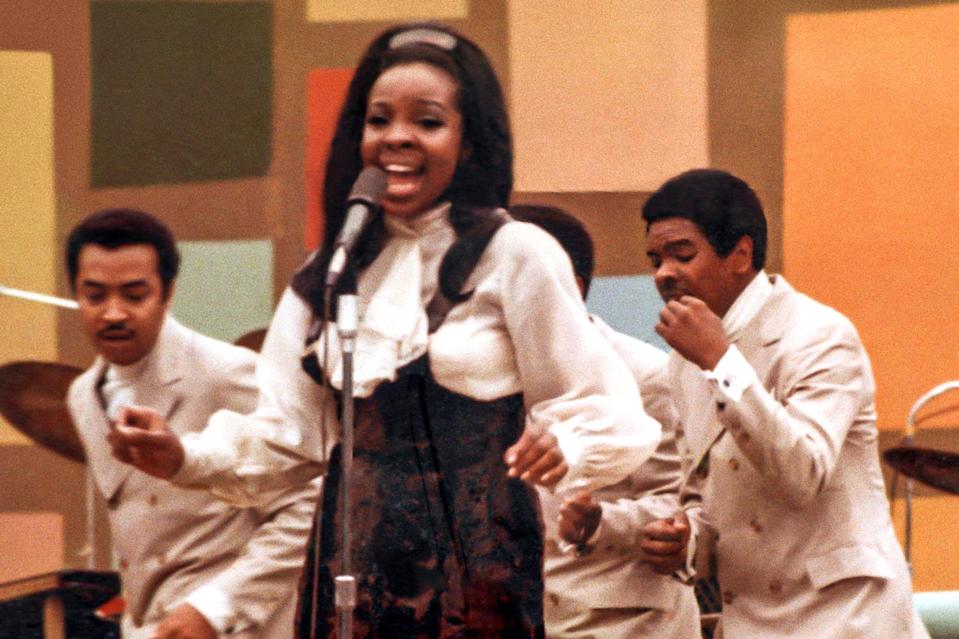It’s entirely appropriate that in 2021, when debates about racism fill our minds and music festivals are still curtailed that Summer of Soul, filmed in 1969 but forgotten for decades, should win Sundance and hit our screens. Its director Questlove (aka Ahmir Khalib Thompson) is a man of many talents, frontman with The Roots, a DJ with an extraordinary vinyl collection and a music journalist. Turning his hand to documentary film-making, Questlove has cut together 40 hours of footage from a forgotten series of concerts which took place in Harlem in the summer of ’69.
Hal Tulchin (who died in 2017) had hopes that the performances he filmed would be turned into a feature, its working title, glimpsed on a clapperboard was Black Woodstock. But there was no interest and apart from one-off late night screenings on a local TV station in ‘69, these historic performances have languished unseen in a basement for decades. Restored and remastered, the concert footage has been edited together with news footage from the time and recently shot interviews with some of the performers, audience members and cultural commentators.
It’s a heady brew that makes Summer of Soul far more than just another concert film. Right from the outset, Questlove anchors the Harlem Cultural Festival in the context of its era. We watch a snappy précis of how the assassinations of JFK, Malcolm X, Martin Luther King and the disproportionate deaths of black American soldiers in Vietnam led to the riots that swept American cities in ’68. Putting on six weekends of free concerts in a park in Harlem was one way “to keep black folks from burning up the city again in ’69.” Gladys Knight sums it up when she reflects: "it wasn’t just about the music, we wanted progress and we wanted our people lifting us up". Towards the documentary’s end, after giving fierce performances of "Mr Backlash" and "Young, Gifted and Black", Nina Simone observes: "How can you be an artist and not reflect the times?”
 Questlove pays tribute not just to Tulchin, who bequeathed him excellent multi-camera footage from a range of angles and high quality sound recording, but also to the festival's instigator Tony Lawrence. Lounge singer and music promoter, he’s described as a "hustler in the best sense". Lawrence not only persuaded performers from Motown (Stevie Wonder, Jimmy Ruffin, Gladys Knight & the Pips, pictured above) but also the superstars of gospel – Mahalia Jackson, The Edwin Hawkins Singers and The Staple Singers - to share the stage with an impassioned Jesse Jackson. The resulting series of concerts are described by Lin Manuel Miranda and his father as a melting pot of brown and black artists – there are performances by musicians of Puerto Rican and Cuban origin as well as a blistering set from the South African jazz trumpeter Hugh Masakela.
Questlove pays tribute not just to Tulchin, who bequeathed him excellent multi-camera footage from a range of angles and high quality sound recording, but also to the festival's instigator Tony Lawrence. Lounge singer and music promoter, he’s described as a "hustler in the best sense". Lawrence not only persuaded performers from Motown (Stevie Wonder, Jimmy Ruffin, Gladys Knight & the Pips, pictured above) but also the superstars of gospel – Mahalia Jackson, The Edwin Hawkins Singers and The Staple Singers - to share the stage with an impassioned Jesse Jackson. The resulting series of concerts are described by Lin Manuel Miranda and his father as a melting pot of brown and black artists – there are performances by musicians of Puerto Rican and Cuban origin as well as a blistering set from the South African jazz trumpeter Hugh Masakela.
Summer of Soul captures black American music at a historic turning point in both content and style. The synchronised dance moves and tailored suits worn by the Motown perfomers are a stark contrast to the dashikis and Afros being sported by audience members; Sly and the Family Stone’s psychedelic outfits and white drummer also changed the goalposts. The documentary also tracks the origins of familiar songs – the story behind the Fifth Dimension’s worldwide hit, "Age of Aquarius/Let the Sunshine In" is beautifully told.
But as well as providing an incomparable primer in black American music’s evolution, Questlove and his production team bring to light many forgotten moments in the history of the civil rights movement, including the journalist Charlayne Hunter-Gaunt’s impassioned campaign to replace the word "negro" with "black" in The New York Times. It’s fascinating to see the city’s then mayor, Republican John Lindsay, welcomed throughout Harlem in news footage and get up and share the stage where he's described as a "blue-eyed soul brother".
And in the week that we’ve seen billionaires with nothing better to do with their cash than launch vanity space tourism, it’s riveting to see the 1969 vox pops decrying the money wasted on the contemporaneous Apollo moon walk : “Groovy for certain white people but not for the black man". The only flaw in Summer of Soul may be that its makers have tried to cram too much in. Blink and you’ll miss sound bites from people like Chris Rock tat indicate they overshot their modern-day interviewees. Roll on the extended cut.















Add comment